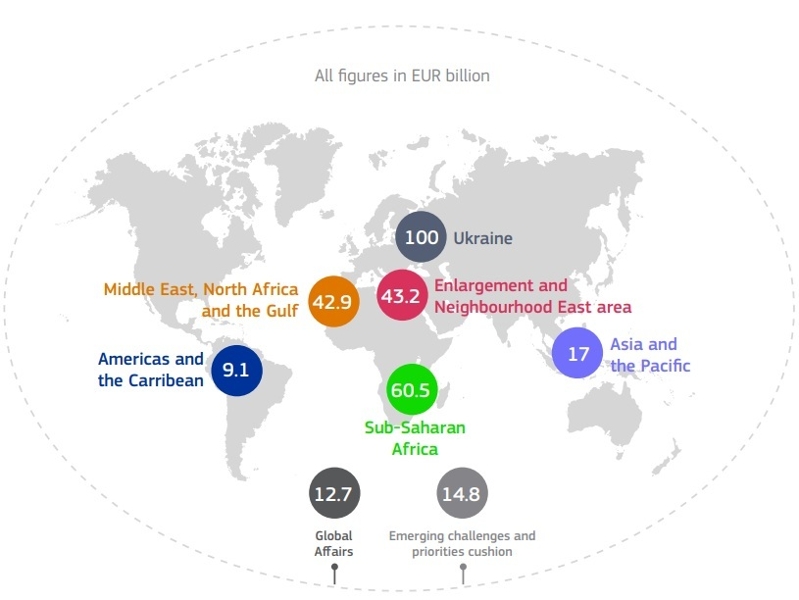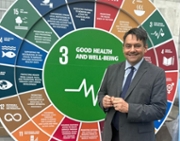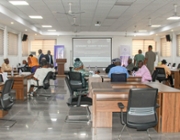First proposals for the next EU Multi-annual Financial Framework

25 July 2025
On 16 July the European Commission unveiled its proposal for the new Multiannual Financial Framework (MFF) which will cover the period 2028 to 2034. The EU is calling this the ‘most ambitious ever’, with a budget worth €2 trillion, including €200 billion dedicated to Global Europe, a consolidated instrument for financing all of the EU’s external commitments.
What is the MFF
Every seven years the EU adopts a new MFF which sets out its long-term spending and revenue priorities. The current MFF was adopted in 2020 for the 2021–2027 period, and included the Neighbourhood, Development and International Cooperation Instrument (NDICI). This was the main financial instrument used by the EU for its external action, focusing on development, improving governance, and combating climate change in non-EU countries. The majority of funds were geographised, which meant their spending priorities were set at country-level with partners. While the NDICI brought together a number of separate instruments, under the new MFF proposal there will be further agglomeration.
Merging funding instruments
The proposed Global Europe Instrument brings together development support to partner countries under the Global Gateway strategy & Team Europe approach; support to countries on the path to joining the Union; and support to the EU’s Southern & Eastern Neighbourhood - all of which are currently supported under separate instruments.
The Global Europe Instrument proposes to structure funding around five geographic areas: Europe; Middle East, North Africa and the Gulf; Sub-Saharan Africa; Asia and the Pacific; and Americas and the Caribbean; with an additional complementary Global Pillar.
Changes to funding priorities
While the Global Europe instrument is planned to receive €200billion - a 75% increase on past funding - €100billion of this is planned to support Ukraine’s recovery, resilience and path towards EU membership. The remaining funds are proposed to be divided across regions as follows:
- Sub-Saharan Africa : 60.5 billion
- Enlargement & Neighbourhood East: 43.2 billion
- Middle East, North Africa and the Gulf: 42.9 billion
- Asia and the Pacific: 17 billion
- Americas and the Caribbean: 9.1 billion
In addition to the regional division of funds there will also be envelopes for :
- Emerging challenges & priorities: 14.8 billion
- Global affairs: 12.7 billion
The new MFF includes ongoing commitments to the Sustainable Development Goals and Europe’s role in helping to close the financing gap and accelerate progress, as well as commitments to mutually beneficial partnerships and comprehensive cooperation, humanitarian aid and support to the most vulnerable.
Next steps in the journey
There will be a long road to move from this first proposal to an approved multi-annual financial framework. The next steps will be detailed negotiations led by the Council of the European Union to reach a unanimous agreement among all 27 member states. Following the Council's agreement, the European Parliament must give its consent to the MFF proposal, after which it will be formally adopted, allowing for the implementation of the new budget cycle starting in January 2028.
CLGF inputs
CLGF and its partners are preparing inputs into this process and will be actively following the developments as they move forward over the next year. We will be working to influence change towards the best possible outcomes for development support to the Global South, as well as maintain and increase recognition of the important role of local government in development, both in Europe and globally.
The decision on the future long-term EU budget and revenue system will be discussed by Member States in the Council, acting in unanimity, with the consent of the European Parliament on the MFF, and where relevant – ratification by national parliaments for the revenue. The Commission will do everything in its power to support a swift agreement.
CLGF Head of Programmes, Claire Frost, said: “We are pleased to see the ongoing commitment to the Sustainable Development Goals and to value based partnerships as part of the proposals for the Global Europe Instrument. We will continue to advocate for ongoing support to local government and to represent the interests of our members throughout the Commonwealth as this process moves forward.”
Back to News





